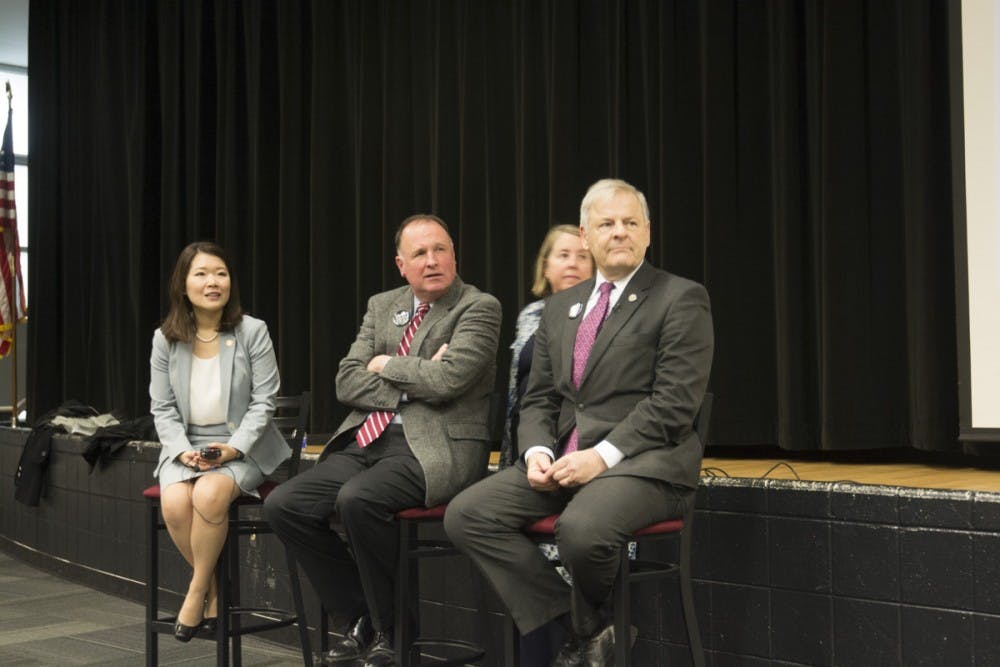Charlottesville’s two representatives in the Virginia General Assembly — Sen. Creigh Deeds (D-Bath) and Del. David Toscano (D-Charlottesville), the outgoing minority leader in the Virginia House of Delegates — held a joint town hall meeting Tuesday evening at Monticello High School to discuss the upcoming Virginia General Assembly session, which begins in January. The Democratic caucus in the legislature saw sweeping gains in the 2017 off-year elections, and Democrats are looking to flip the state house blue in the upcoming 2019 elections.
The pair was joined by Dr. Jennifer Lee, the director of Virginia's Department of Medical Assistance Services, who gave an update on the Medicaid expansion bill passed during last year’s General Assembly.
Deeds and Toscano began by highlighting some of the other achievements from the last legislative session, including bills which limited school suspensions, raised the threshold for felony larceny to $500 and offered protection to water quality in areas affected by the construction of natural gas pipelines.
In looking forward to the upcoming legislative session, Toscano pointed out a number of initiatives that the Democratic caucus would focus on, one of those initiatives being a push for Virginia to become the 38th state to ratify the Equal Rights Amendment, a proposed amendment to the U.S. Constitution which would guarantee legal equality regardless of sex.
“The Equal Rights Amendment, one of the number one priorities of the Democratic Caucus in the house,” Toscano said. “We actually have a shot at doing this. We could be the thing that puts us over the top.”
Electoral reform was also a prime focus for the upcoming session. Deeds pointed out his plan to introduce a bill which would act as the state’s pilot program into ranked choice voting, a system which allows for voters to rank numerous candidates in order of preference. The ranked choice voting system has been implemented in smaller areas around the country, and most notably saw its first federal election in the 2018 midterm election in Maine. Toscano also mentioned the upcoming redistricting of Congressional districts in the state, which he believes would shift the map more positively towards Democrats.
“We’re going to have new maps unless the U.S. Supreme Court intervenes,” Toscano said. “Once that happens, we got 10 more seats in play.”
They also signaled a willingness to pass a state amendment to permanently delegate the redistricting process to a nonpartisan commission. One attendee asked about an amendment currently being generated by the anti-gerrymandering advocacy group One Virginia 2021.
“I will plan on supporting some sort of constitutional amendment that will take redistricting away from the General Assembly,” Deeds said. “I think there’s a built in conflict of interest with people like me picking the district I get to run in.”
There was also discussion about what the legislature would decide to do with the budget surplus of over $550 million that emerged from the state’s last fiscal year. Toscano said he supports a new income tax credit, putting the money into educational systems or using the money as part of a larger infrastructure project to repair Interstate 81 as potential allocations of the surplus funds.
The representatives also highlighted a desire to increase the role of renewable energy in the state, raise the state’s minimum wage and lower healthcare costs in the Charlottesville area. The lawmakers also mentioned renewed efforts to grant local areas more control over Confederate monuments and to implement new gun control laws, both efforts which failed to take off during the last legislative session. After presenting their own goals and achievements, Toscano and Deeds opened up the floor to questions.
The most common factor across the night was a close focus on healthcare, often times in relation to the Medicaid expansion which was approved following the 2018 General Assembly after five years of resistance.
The expansion, as explained by Lee, will allow over 400,000 previously ineligible Virginians to enroll in Medicaid beginning Jan. 1.
Lee said that the program will most notably expand to include Virginians who are not ensured by their employers, such as those working in construction, retail or childcare.
“Most of them are working, but they are working for sectors or industries where health coverage was either not available or not affordable to them,” Lee said. “As a result, they are not getting the care that they need.”
With the expansion, a family of three who used to be covered by the plan so long as they earn an annual income of less than $6,924, will now be covered up until they earn $28,000 a year. Childless adults, who were not previously covered by the plan, will be covered up until they earn up to $16,750.
Lee added that the crux of expansion is that it allows more people to enroll by raising the bar of eligibility beyond the poverty line.
“[Expansion] increases the ceiling for eligibility for some of these categories, and then it even enables those childless adults who are not eligible under any circumstance before to be eligible now … So this is really the crux to understanding what expansion does.”
Beyond the expansion of access, Lee said the program will include access to treatment for addiction.
“We've been having some excellent results as we increase the range of evidence based services to treat addiction, especially opioid addiction, to our addiction recovery treatment services program, and the folks who are coming into Medicaid expansion … will have the same access to that,” Lee said.
Deeds added that, though he is happy with the expansion so far, there is still work to be done to insure that this program equally takes care of all its clients.
“This population has more access to affordable healthcare than the existing Medicaid population,” Deeds said. “Medicaid does not cover adult dental or vision … so that's a shortcoming of our program.”







